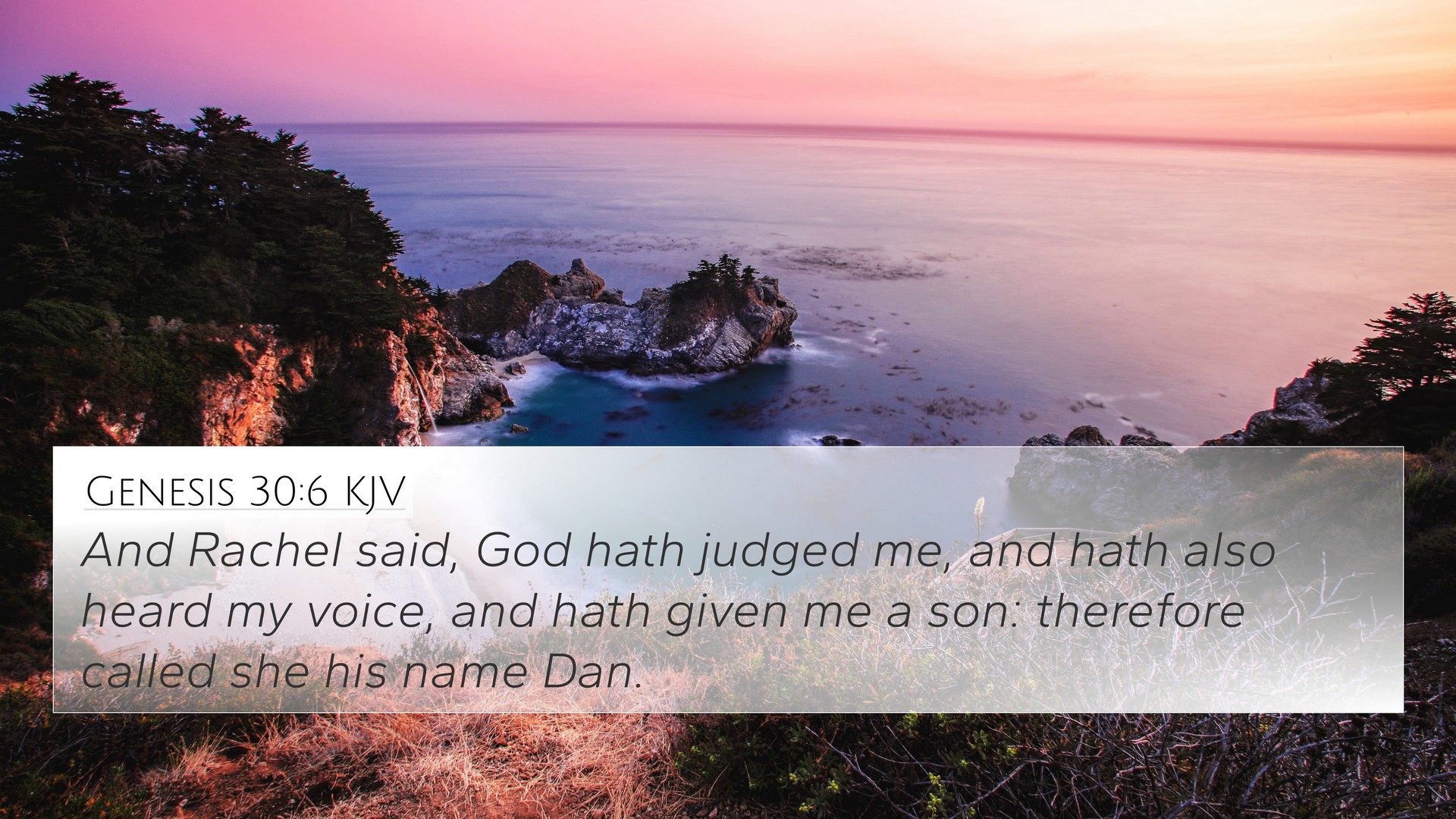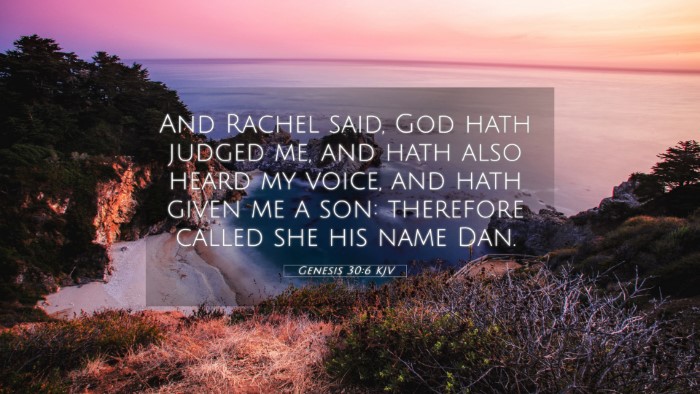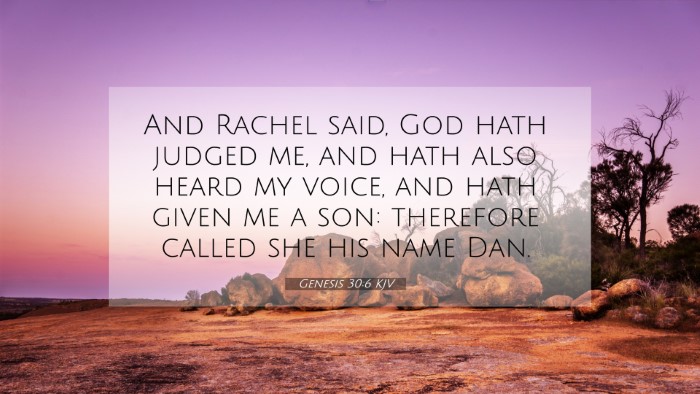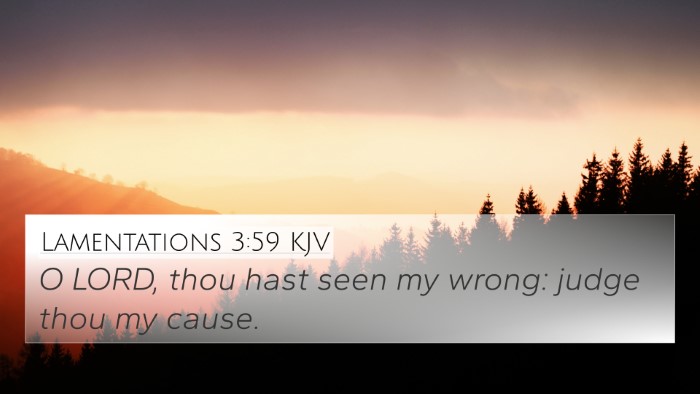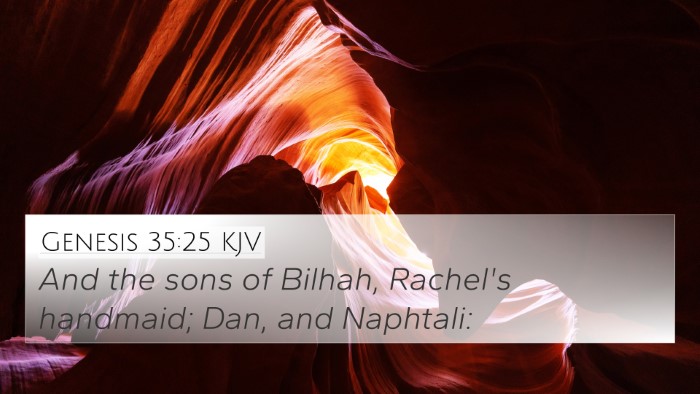Understanding Genesis 30:6
Bible Verse: Genesis 30:6 - "And Rachel said, God hath judged me, and hath also heard my voice, and hath given me a son: therefore called she his name Dan."
Summary of the Verse
This passage reveals the emotional and spiritual dimensions of Rachel as she bears a child named Dan. Her declaration reflects her belief that God has made a judgment in her favor, indicating God's role in her life and circumstances.
Commentary Insights
-
Matthew Henry's Commentary:
Henry emphasizes the providential workings of God in Rachel’s life. He notes that Rachel’s anguish regarding her barrenness is transformed into joy with the birth of Dan. This serves as an illustration of God’s justice in fulfilling promises and providing for those in distress.
-
Albert Barnes' Notes:
Barnes reflects on the significance of the name "Dan," which means "judgment." He explains that Rachel acknowledges God’s intervention in her struggle, implicitly linking her circumstances to divine favor in the face of her opposition with Leah.
-
Adam Clarke's Commentary:
Clarke further explains the theological implications of Rachel's statement, analyzing her recognition of God’s voice and action in giving her son. He highlights a strong connection between her desire and God's responsiveness, showcasing the themes of prayer and divine answer.
Key Themes and Theological Reflections
This verse highlights several important Biblical themes, including:
- Divine Providence: God's active participation in the lives of individuals, addressing their needs and desires.
- Intercession in Distress: The importance of crying out to God in times of need and the expectant attitude towards His response.
- Identity and Meaning: The naming of children in the Bible often carries deep theological significance, linking personal circumstances to God's broader plan.
Cross-References Related to Genesis 30:6
Below are several Bible verses that are interconnected with Genesis 30:6, demonstrating the theological and narrative continuity throughout the Scriptures:
- 1 Samuel 1:20 - Hannah's experience of barrenness and subsequent birth reflects similar themes of divine intervention.
- Genesis 29:35 - The birth of Leah's children shows the competitive nature of Rachel and Leah's relationship.
- Psalms 113:9 - God's ability to make the barren woman a joyful mother is echoed here.
- Isaiah 54:1 - A call for rejoicing from barren women, similar to Rachel's situation.
- Luke 1:25 - Elizabeth's declaration on bearing a child reflects a New Testament connection to God's mercy.
- Romans 9:15-16 - God's sovereignty in choosing whom He blesses ties back to Rachel's acknowledgment of God's judgment.
- Job 30:1 - Job’s lament highlights the contrast of divine judgment and human suffering, resonating with Rachel's situation.
Thematic Bible Verse Connections
The exploration of Genesis 30:6 through the lenses of various commentaries and cross-references unveils a rich tapestry of themes, including:
- God's justice and favor
- The act of divine hearing and responding
- Parallels between Old Testament barrenness and New Testament themes of divine promise
Utilizing Bible Cross-References
For deeper insights into the Scriptures, utilizing tools for Bible cross-referencing can greatly enhance understanding. Here are some tips:
- Bible Concordance: A valuable resource to find verses related to specific themes or words.
- Cross-Reference Bible Study: Systematically connecting verses during study can unveil broader biblical narratives.
- Comparative Bible Verse Analysis: By comparing similar verses, one can identify and reflect on powerful connections.
Conclusion
Genesis 30:6 encapsulates a poignant moment in Rachel's life that illustrates God's active involvement in human affairs, emphasizing themes relevant across both Testaments. Through careful analysis and understanding of cross-references, readers can gain a richer appreciation for the interwoven fabric of the Bible.
